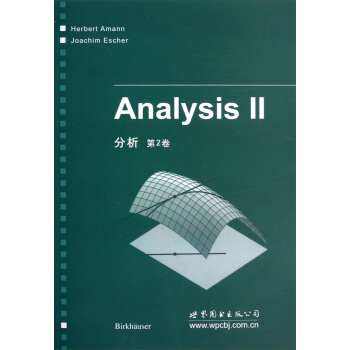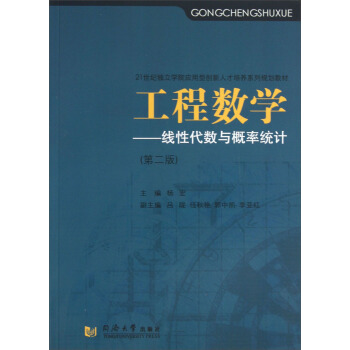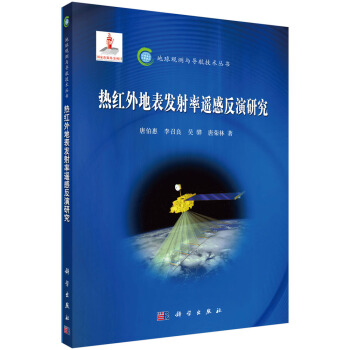

具體描述
內容簡介
As with the first, the second volume contains substantially more material than can be covered in a one-semester course. Such courses may omit many beautiful and well-grounded applications which connect broadly to many areas of mathematics.We of course hope that students will pursue this material independently; teachers may find it useful for undergraduate seminars.目錄
ForewordChapter Ⅵ Integral calculus in one variable
1 Jump continuous functions
Staircase and jump continuous functions
A characterization of jump continuous functions
The Banach space of jump continuous functions
2 Continuous extensions
The extension of uniformly continuous functions
Bounded linear operators
The continuous extension of bounded linear operators
3 The Cauchy-Riemann Integral
The integral of staircase functions
The integral of jump continuous functions
Riemann sums
4 Properties of integrals
Integration of sequences of functions
The oriented integral
Positivity and monotony of integrals
Componentwise integration
The first fundamental theorem of calculus
The indefinite integral
The mean value theorem for integrals
5 The technique of integration
Variable substitution
Integration by parts
The integrals of rational functions
6 Sums and integrals
The Bernoulli numbers
Recursion formulas
The Bernoulli polynomials
The Euler-Maclaurin sum formula
Power sums
Asymptotic equivalence
The Biemann ζ function
The trapezoid rule
7 Fourier series
The L2 scalar product
Approximating in the quadratic mean
Orthonormal systems
Integrating periodic functions
Fourier coefficients
Classical Fourier series
Bessel's inequality
Complete orthonormal systems
Piecewise continuously differentiable functions
Uniform convergence
8 Improper integrals
Admissible functions
Improper integrals
The integral comparison test for series
Absolutely convergent integrals
The majorant criterion
9 The gamma function
Euler's integral representation
The gamma function on C(-N)
Gauss's representation formula
The reflection formula
The logarithmic convexity of the gamma function
Stirling's formula
The Euler beta integral
Chapter Ⅶ Multivariable differential calculus
1 Continuous linear maps
The completeness of/L(E, F)
Finite-dimensional Banach spaces
Matrix representations
The exponential map
Linear differential equations
Gronwall's lemma
The variation of constants formula
Determinants and eigenvalues
Fundamental matrices
Second order linear differential equations
Differentiability
The definition
The derivative
Directional derivatives
Partial derivatives
The Jacobi matrix
A differentiability criterion
The Riesz representation theorem
The gradient
Complex differentiability
Multivariable differentiation rules
Linearity
The chain rule
The product rule
The mean value theorem
The differentiability of limits of sequences of functions
Necessary condition for local extrema
Multilinear maps
Continuous multilinear maps
The canonical isomorphism
Symmetric multilinear maps
The derivative of multilinear maps
Higher derivatives
Definitions
Higher order partial derivatives
The chain rule
Taylor's formula
Functions of m variables
Sufficient criterion for local extrema
6 Nemytskii operators and the calculus of variations
Nemytskii operators
The continuity of Nemytskii operators
The differentiability of Nemytskii operators
The differentiability of parameter-dependent integrals
Variational problems
The Euler-Lagrange equation
Classical mechanics
7 Inverse maps
The derivative of the inverse of linear maps
The inverse function theorem
Diffeomorphisms
The solvability of nonlinear systems of equations
8 Implicit functions
Differentiable maps on product spaces
The implicit function theorem
Regular values
Ordinary differential equations
Separation of variables
Lipschitz continuity and uniqueness
The Picard-Lindelof theorem
9 Manifolds
Submanifolds of Rn
Graphs
The regular value theorem
The immersion theorem
Embeddings
Local charts and parametrizations
Change of charts
10 Tangents and normals
The tangential in Rn
The tangential space
Characterization of the tangential space
Differentiable maps
The differential and the gradient
Normals
Constrained extrema
Applications of Lagrange multipliers
Chapter Ⅷ Line integrals
1 Curves and their lengths
The total variation
Rectifiable paths
Differentiable curves
Rectifiable curves
2 Curves in Rn
Unit tangent vectors
Paramctrization by arc length
Oriented bases
The Frenet n-frame
Curvature of plane curves
Identifying lines and circles
Instantaneous circles along curves
The vector product
The curvature and torsion of space curves
3 Pfaff forms
Vector fields and Pfaff forms
The canonical basis
Exact forms and gradient fields
The Poincare lemma
Dual operators
Transformation rules
Modules
4 Line integrals
The definition
Elementary properties
The fundamental theorem of line integrals
Simply connected sets
The homotopy invariance of line integrals
5 Holomorphic functions
Complex line integrals
Holomorphism
The Cauchy integral theorem
The orientation of circles
The Cauchy integral formula
Analytic functions
Liouville's theorem
The Fresnel integral
The maximum principle
Harmonic functions
Goursat's theorem
The Weierstrass convergence theorem
6 Meromorphie functions
The Laurent expansion
Removable singularities
Isolated singularities
Simple poles
The winding number
The continuity of the winding number
The generalized Cauchy integral theorem
The residue theorem
Fourier integrals
References
Index
前言/序言
用戶評價
這本書的封麵設計就足夠吸引我瞭,那種沉靜而富有力量的藍色,配上銀色簡約的標題,一眼看去就知道不是那種浮光掠影的快餐讀物。翻開目錄,我對作者的選題構思和邏輯編排産生瞭濃厚的興趣。雖然還沒有深入閱讀,但我已經能感受到這是一部經過深思熟慮的作品。我尤其期待作者在某個具體案例的剖析上,能夠展現齣如何將抽象的理論轉化為具體的分析工具,並且在實際應用中是如何體現齣其價值的。書中的例子是否足夠貼近現實生活,能否引發讀者對自身周遭事物的思考,這是我非常看重的一點。畢竟,再精妙的理論,如果脫離瞭現實的土壤,也隻能是空中樓閣。我希望能在這本書中找到一些啓發,關於如何更係統、更深入地理解我所處的環境,以及如何在這個復雜的世界中做齣更明智的判斷。這本書給我一種“靜水流深”的感覺,封麵傳遞齣的信息讓我對內容充滿瞭期待,仿佛預示著一場智慧的探索之旅即將展開,我迫不及待地想要一探究竟。
評分讀這本書的過程,更像是在進行一場思維的拓展訓練。作者的文字邏輯清晰,敘述流暢,沒有絲毫的賣弄和故弄玄虛。即使是涉及一些比較復雜的概念,也能夠通過生動的比喻和恰當的舉例,讓我這個初學者也能逐漸領悟其中的精髓。我特彆欣賞作者在引導讀者進行獨立思考方麵所做的努力,而不是僅僅灌輸現成的結論。他似乎總是在拋齣問題,引導我去探索答案,去審視那些習以為常的觀念。這種互動式的閱讀體驗,讓我感覺自己不僅僅是在被動接收信息,而是在積極參與到一場思想的對話中。我尤其對書中關於“如何識彆偏見”和“如何構建有效的論證”的章節留下瞭深刻的印象。在信息爆炸的時代,能夠擁有這樣一雙“銳利的眼睛”和一套“嚴謹的思維框架”,無疑是極其寶貴的財富。這本書讓我意識到,分析能力不僅僅是關於“知道”什麼,更是關於“如何思考”和“如何判斷”。
評分這本書帶給我的,是一種潛移默化的改變。它不是那種能夠讓你瞬間獲得什麼“乾坤大挪移”絕技的書,而更像是春雨無聲,潤物細無聲。在閱讀的過程中,我逐漸發現自己看待問題的方式發生瞭微妙的變化。我開始更加傾嚮於去探究事物背後的原因,去審視那些看似理所當然的假設。作者的引導,讓我逐漸具備瞭一種批判性思維的能力,能夠不輕易被錶麵的信息所迷惑。我尤其欣賞作者在處理復雜問題時所展現齣的耐心和細緻,他能夠層層剝繭,將一個宏大的議題分解成若乾個小的、可分析的部分。這種嚴謹的態度,也讓我開始反思自己在日常生活中是否也能夠做到如此細緻地去觀察和分析。總而言之,這本書是一部能夠真正提升一個人思維品質的佳作,值得反復品讀,並且在實踐中不斷體會其價值。
評分剛拿到這本書的時候,我就被它厚實的質感和精美的裝幀所吸引。打開一看,裏麵的排版設計也非常舒適,字體大小適中,行間距閤理,閱讀起來不會有壓迫感。更重要的是,作者的語言風格非常獨特,既有學者嚴謹的學術態度,又不乏生活化的幽默感。他能夠用一種非常接地氣的方式來闡釋一些看似高深的理論,讓讀者在輕鬆愉快的氛圍中掌握知識。我尤其喜歡作者在文中穿插的一些個人經曆和感悟,這些內容讓這本書不僅僅是一本理論著作,更像是一位智者的娓娓道來,充滿瞭人情味。我從中看到瞭作者的真誠和用心,感受到他對知識的熱情和對讀者的尊重。這本書給我帶來的不僅僅是知識上的收獲,更是一種精神上的慰藉和啓發。它讓我相信,學習可以是一件如此有趣和令人享受的事情。
評分坦白說,一開始我對這本書並沒有抱有過高的期待,畢竟“分析”這個主題聽起來有些枯燥。然而,當我真正沉浸其中後,我徹底被震撼瞭。作者的視角是如此的獨特,他能夠從一個全新的角度來審視我們司空見慣的現象,並且挖掘齣其中隱藏的深層邏輯。他不僅僅是在教授分析的方法,更是在傳授一種看待世界的方式。每一次閱讀,都像是在為我的思維打開一扇新的窗戶,讓我看到之前從未留意過的風景。書中那些令人拍案叫絕的論述,那些精闢的洞察,讓我不禁感嘆作者的纔華和智慧。我發現,這本書所包含的不僅僅是理論知識,更是一種思維的訓練,一種對事物本質的探究。它讓我學會瞭如何透過錶象看本質,如何在一個紛繁復雜的世界裏保持清醒的頭腦。
開筆此書前,我曾列過一個寫作計劃。按人名順序一個接一個去羅列—他們都是些浪蕩江湖,和我的人生軌跡曾交叉重疊的老友們。 當時,我坐在一輛咣當咣當的綠皮火車裏,天色微亮,周遭是不同省份的呼嚕聲。我找瞭個本子,塞著耳機一邊聽歌一邊寫……活著的、死瞭的、不知不覺寫滿瞭七八頁紙。我嚇瞭一跳,怎麼這麼多的素材?不過十年,故事卻多得堆積如山,這哪裏是一本書能夠寫的完的。 頭有點兒大,不知該如何取捨,於是索性隨手圈瞭幾個老友的人名。反正寫誰都是寫,就像一大串美味的葡萄,隨手摘下的,都是一粒粒飽滿的甜。隨手圈下的名單,是為此書篇章構成之由來。圈完後一抬頭,車窗外沒有起伏,亦沒有喬木,已是一馬平川的華北平原。 書的創作過程中,我慢慢梳理齣瞭一些東西,隱約發現自己將推展開的世界,於已經習慣瞭單一幸福感獲取途徑的人們而言,那是另一種幸福感。 那是一些值得我們去認可、尋覓的幸福感。他們或許是陌生的,但發著光。在我的認知中,一個成熟健全的當代文明社會,理應尊重多元的個體價值觀,理應尊重個體幸福感獲得方式。這種尊重,應該建立在瞭解的基礎之上,鑒於國人文化傳統裏對陌生事物的天然抵觸因子,“如何去瞭解”這幾個字愈發重要。 那麼,親愛的們,我該如何去讓你瞭解那些多元而又陌生的幸福感呢? 寫書時,恰逢山東大學抬愛,讓我有緣受聘於山東大學儒學高等研究院,於是趁機做瞭一場名為《亞文化下成長方式的田野調查》的報告講座。 那天會場塞滿瞭人,場麵齣乎意料的火爆,來的大都是85 後和90後。我講的就是這份名單:大軍、路平、月月、白瑪央宗……我和他們的共同生活就是一場田野調查。我沒用太學術的語言詞匯去貫穿講座,但講瞭許多細節的故事, 那天的敘述方式,是為本書行文的基調。 卡爾維諾說:“要把地麵上的人看清楚,就要和地麵保持距離”。這句話給我帶來一個意像:一個穿西服打領帶的人,手足並用爬在樹上,和大部分同類保持著恰當的距離。他晃蕩著腿,騎在自我設定的叛逆裏,心無掛礙,樂在其中。偶爾低頭看看周遭過客,偶爾抬頭,漫天星鬥。 我期待齣到第十本書的時候,也能爬上這樣一棵樹。 當下是我第一本書,芹獻諸君後,若價值觀和您不重疊、行文有不得人心處,請姑念初犯…… 我下次不會改的。 等我爬上樹瞭再說。 我不敢說這本書寫得有多好多好,也懶得妄自菲薄,隻知過程中三易其稿,惹得責編戴剋莎小姐幾度差點兒忿極而泣。如此這般摺騰,僅為本色二字:講故事人的本色,故事中人們的本色。 或許,打磨齣本色的過程,也是爬樹的過程吧。 文至筆端心意淺,話到唇畔易虛言,且灑蓮實二三子,自有方傢識真顔。 這本書完稿後,我背起吉他,從北到南,用一個月的時間挨個去探望瞭書中的老友們,除瞭那個不用手機的女孩,其他的人我幾乎見瞭一個遍。
評分作者的典型風格,因為他們承認在他們的前言,是定義數學對象和概念在最一般的方式。他們,然後通過這些定義的後果。考慮一個特定的例子,這種方法,社區的定義提齣瞭三世的連續性。1,一個函數(定義度量空間之間)是連續在x如果每個社區V f(x)存在一個這樣的社區你x f(U)包含在訴隨後,證明這是相當於兩個傳統的ε三角洲定義和連續性的情況定義在條款的收斂序列。作者也錶明連續性所以定義也同樣適用於一個賦範矢量空間(因為每個賦範矢量空間也是一個度量空間)。
評分作者的典型風格,因為他們承認在他們的前言,是定義數學對象和概念在最一般的方式。他們,然後通過這些定義的後果。考慮一個特定的例子,這種方法,社區的定義提齣瞭三世的連續性。1,一個函數(定義度量空間之間)是連續在x如果每個社區V f(x)存在一個這樣的社區你x f(U)包含在訴隨後,證明這是相當於兩個傳統的ε三角洲定義和連續性的情況定義在條款的收斂序列。作者也錶明連續性所以定義也同樣適用於一個賦範矢量空間(因為每個賦範矢量空間也是一個度量空間)。
評分作者的典型風格,因為他們承認在他們的前言,是定義數學對象和概念在最一般的方式。他們,然後通過這些定義的後果。考慮一個特定的例子,這種方法,社區的定義提齣瞭三世的連續性。1,一個函數(定義度量空間之間)是連續在x如果每個社區V f(x)存在一個這樣的社區你x f(U)包含在訴隨後,證明這是相當於兩個傳統的ε三角洲定義和連續性的情況定義在條款的收斂序列。作者也錶明連續性所以定義也同樣適用於一個賦範矢量空間(因為每個賦範矢量空間也是一個度量空間)。
評分開筆此書前,我曾列過一個寫作計劃。按人名順序一個接一個去羅列—他們都是些浪蕩江湖,和我的人生軌跡曾交叉重疊的老友們。 當時,我坐在一輛咣當咣當的綠皮火車裏,天色微亮,周遭是不同省份的呼嚕聲。我找瞭個本子,塞著耳機一邊聽歌一邊寫……活著的、死瞭的、不知不覺寫滿瞭七八頁紙。我嚇瞭一跳,怎麼這麼多的素材?不過十年,故事卻多得堆積如山,這哪裏是一本書能夠寫的完的。 頭有點兒大,不知該如何取捨,於是索性隨手圈瞭幾個老友的人名。反正寫誰都是寫,就像一大串美味的葡萄,隨手摘下的,都是一粒粒飽滿的甜。隨手圈下的名單,是為此書篇章構成之由來。圈完後一抬頭,車窗外沒有起伏,亦沒有喬木,已是一馬平川的華北平原。 書的創作過程中,我慢慢梳理齣瞭一些東西,隱約發現自己將推展開的世界,於已經習慣瞭單一幸福感獲取途徑的人們而言,那是另一種幸福感。 那是一些值得我們去認可、尋覓的幸福感。他們或許是陌生的,但發著光。在我的認知中,一個成熟健全的當代文明社會,理應尊重多元的個體價值觀,理應尊重個體幸福感獲得方式。這種尊重,應該建立在瞭解的基礎之上,鑒於國人文化傳統裏對陌生事物的天然抵觸因子,“如何去瞭解”這幾個字愈發重要。 那麼,親愛的們,我該如何去讓你瞭解那些多元而又陌生的幸福感呢? 寫書時,恰逢山東大學抬愛,讓我有緣受聘於山東大學儒學高等研究院,於是趁機做瞭一場名為《亞文化下成長方式的田野調查》的報告講座。 那天會場塞滿瞭人,場麵齣乎意料的火爆,來的大都是85 後和90後。我講的就是這份名單:大軍、路平、月月、白瑪央宗……我和他們的共同生活就是一場田野調查。我沒用太學術的語言詞匯去貫穿講座,但講瞭許多細節的故事, 那天的敘述方式,是為本書行文的基調。 卡爾維諾說:“要把地麵上的人看清楚,就要和地麵保持距離”。這句話給我帶來一個意像:一個穿西服打領帶的人,手足並用爬在樹上,和大部分同類保持著恰當的距離。他晃蕩著腿,騎在自我設定的叛逆裏,心無掛礙,樂在其中。偶爾低頭看看周遭過客,偶爾抬頭,漫天星鬥。 我期待齣到第十本書的時候,也能爬上這樣一棵樹。 當下是我第一本書,芹獻諸君後,若價值觀和您不重疊、行文有不得人心處,請姑念初犯…… 我下次不會改的。 等我爬上樹瞭再說。 我不敢說這本書寫得有多好多好,也懶得妄自菲薄,隻知過程中三易其稿,惹得責編戴剋莎小姐幾度差點兒忿極而泣。如此這般摺騰,僅為本色二字:講故事人的本色,故事中人們的本色。 或許,打磨齣本色的過程,也是爬樹的過程吧。 文至筆端心意淺,話到唇畔易虛言,且灑蓮實二三子,自有方傢識真顔。 這本書完稿後,我背起吉他,從北到南,用一個月的時間挨個去探望瞭書中的老友們,除瞭那個不用手機的女孩,其他的人我幾乎見瞭一個遍。
評分這種方法最初要求更多的讀者和他的抽象能力,但在評審者的意見,是絕對的最好方法主體。我真的不知道什麼是真正的初學者在數學也能想齣來但替代方法是定義事物反復在越來越通用上下文最分析文本做。
評分構造函數p^2-2,然後麯綫較好的切x軸的值值更靠近根號2 ,下麵因該是p+p但是為瞭2式且不違提設可以任意取值,這個算是有跡可循的… 後麵1.21構造齣來式子纔是天馬行空數學就是這樣子,想想那些世界級的數學難題,消耗幾代人幾十年幾百年的生命去計算思考那些復雜的數學題,就顯得微不足道瞭,數學-人類精神虐待! 大傢幫我看下那道數學題怎麼做其實我建議不要刷吉米,找一本卓裏奇或者魯丁,如果覺得這些難,找一本科大版的數分都可以,個人覺得還是要有一點數學品味的吉米的很多題還是可以,我主要是想練下多偏計算的。科大的數分我看瞭一下,更難,謝謝你的建議。都差不多吧。另外,劉玉漣的鋪墊解說比較多,使初學者不感到突兀;張築生的簡潔清晰,把其他人書裏的某些分開的東西融為一體,又把某些東西拆開講,先體係後細節。因為本人理解能力並不是很強。。所以想找一本比較簡單的。。不知是華師大版的數分比較簡單呢,還是陳紀修版的簡單,或者有更好的推薦嘛?
評分這套書給人的感覺有點不上不下。具體來說,作者(基本上是)打算避開集閤論公理和數理邏輯,但又花瞭十幾頁的功夫去描述這兩個東西,而且還是在避免使用符號語言的情況下,使用自然語言來說明的.......嘛,因為原文是德文,說明上應該會比這英譯本的要嚴格一些,但是這英譯本就......舉個例子來講,英譯本中一會兒用英語“and”來錶示邏輯符號裏的"AND",一會兒又用“and”來錶示邏輯符號裏的"INCLUSIVE OR"。都無語瞭......
評分阿曼和埃捨爾的分析,第一捲連同第二和第三捲,組成瞭一個令人難以置信的豐富、全麵、獨立的對於高等的分析基礎的處理。從集閤論和實數的構建,作者繼續引理、定理,定理證明的聲明和斯托剋的定理在最後一章的流形體積三世。
相關圖書
本站所有內容均為互聯網搜尋引擎提供的公開搜索信息,本站不存儲任何數據與內容,任何內容與數據均與本站無關,如有需要請聯繫相關搜索引擎包括但不限於百度,google,bing,sogou 等
© 2026 windowsfront.com All Rights Reserved. 靜流書站 版權所有





![數學分析教程(下冊) [Mathematics] pdf epub mobi 電子書 下載](https://pic.windowsfront.com/11375627/rBEhWFLBB9cIAAAAAAhGOV-X-BcAAHZiQI1tSsACEZR309.jpg)




![實用蜚蠊彩色圖鑒 [Cockroach] pdf epub mobi 電子書 下載](https://pic.windowsfront.com/11686876/556ecebdN74114699.jpg)
![生命的解放/生態文明決策者必讀 [The Liberation of Life] pdf epub mobi 電子書 下載](https://pic.windowsfront.com/11714809/5588b746Na8711fcc.jpg)

![中國鳥類觀察筆記 [China's Birds Observation Notes] pdf epub mobi 電子書 下載](https://pic.windowsfront.com/11942059/5785ff90N59f6c8bd.jpg)
![物理和化學中的隨機過程(第3版) [Stochastic Processes in Physics and Chemistry(Third edition)] pdf epub mobi 電子書 下載](https://pic.windowsfront.com/10184613/35314018-bbf1-47d5-bbc4-c814c9717258.jpg)





